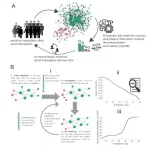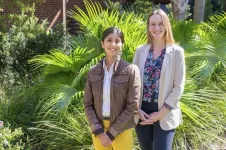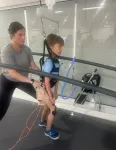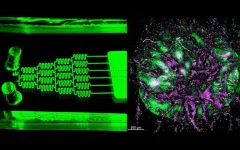(Press-News.org) [Vienna, November 13, 2024] — With artificial intelligence increasingly permeating every aspect of our lives, experts are becoming more and more concerned about its dangers. In some cases, the risks are pressing, in others they won't emerge until many months or even years from now. Scientists point out in The Royal Society’s journal that a coherent approach to understanding these threats is still elusive. They call for a complex systems perspective to better assess and mitigate these risks, particularly in light of long-term uncertainties and complex interactions between A.I. and society.
"Understanding the risks of A.I. requires recognizing the intricate interplay between technology and society. It's about navigating the complex, co-evolving systems that shape our decisions and behaviors,” says Fariba Karimi, co-author of the article. Karimi leads the research team on Algorithmic Fairness at the Complexity Science Hub (CSH) and is professor of Social Data Science at TU Graz.
“We should not only discuss what technologies to deploy and how, but also how to adapt the social context to capitalize on positive possibilities. A.I. possibilities and risks should likely be taken into account in debates about, for instance, economic policy,” adds CSH scientist Dániel Kondor, first author of the study.
Broader and Long-Term Risks
Current risk assessment frameworks often focus on immediate, specific harms, such as bias and safety concerns, according to the authors of the article published in Philosophical Transactions A. “These frameworks often overlook broader, long-term systemic risks that could emerge from the widespread deployment of A.I. technologies and their interaction with the social context they are used,” says Kondor.
“In this paper, we tried to balance the short-term perspectives on algorithms with long-term views of how these technologies affect society. It's about making sense of both the immediate and systemic consequences of A.I.," adds Kondor.
What Happens in Real Life
As a case study to illustrate the potential risks of A.I. technologies, the scientists discuss how a predictive algorithm was used during the Covid-19 pandemic in the UK for school exams. The new solution was “presumed to be more objective and thus fairer [than asking teachers to predict their students’ performance], relying on a statistical analysis of students’ performance in previous years,” according to the study.
However, when the algorithm was put into practice, several issues emerged. “Once the grading algorithm was applied, inequities became glaringly obvious,” observes Valerie Hafez, an independent researcher and study co-author. “Pupils from disadvantaged communities bore the brunt of the futile effort to counter grading inflation, but even overall, 40% of students received lower marks than they would have reasonably expected.”
Hafez reports that many responses in the consultation report indicate that the risk perceived as significant by teachers—the long-term effect of grading lower than deserved—was different from the risk perceived by the designers of the algorithm. The latter were concerned about grade inflation, the resulting pressure on higher education, and a lack of trust in students’ actual abilities.
The Scale and the Scope
This case demonstrates several important issues that arise when deploying large-scale algorithmic solutions, emphasize the scientists. “One thing we believe one should be attentive to is the scale—and scope—because algorithms scale: they travel well from one context to the next, even though these contexts may be vastly different. The original context of creation does not simply disappear, rather it is superimposed on all these other contexts,” explains Hafez.
"Long-term risks are not the linear combination of short-term risks. They can escalate exponentially over time. However, with computational models and simulations, we can provide practical insights to better assess these dynamic risks,” adds Karimi.
Computational Models – and Public Participation
This is one of the directions proposed by the scientists for understanding and evaluating risk associated with A.I. technologies, both in the short- and long-term. “Computational models—like those assessing the effect of A.I. on minority representation in social networks—can demonstrate how biases in A.I. systems lead to feedback loops that reinforce societal inequalities,” explains Kondor. Such models can be used to simulate potential risks, offering insights that are difficult to glean from traditional assessment methods.
In addition, the study's authors emphasize the importance of involving laypeople and experts from various fields in the risk assessment process. Competency groups—small, heterogeneous teams that bring together varied perspectives—can be a key tool for fostering democratic participation and ensuring that risk assessments are informed by those most affected by AI technologies.
“A more general issue is the promotion of social resilience, which will help A.I.-related debates and decision-making function better and avoid pitfalls. In turn, social resilience may depend on many questions unrelated (or at least not directly related) to artificial intelligence,” ponders Kondor. Increasing participatory forms of decision-making can be one important component of raising resilience.
“I think that once you begin to see A.I. systems as sociotechnical, you cannot separate the people affected by the A.I. systems from the ‘technical’ aspects. Separating them from the A.I. system takes away their possibility to shape the infrastructures of classification imposed on them, denying affected persons the power to share in creating worlds attenuated to their needs,” says Hafez, who’s an A.I. policy officer at the Austrian Federal Chancellery.
About the Study
The study “Complex systems perspective in assessing risks in A.I.,” by Dániel Kondor, Valerie Hafez, Sudhang Shankar, Rania Wazir, and Fariba Karimi was published in Philosophical Transactions A and is available online.
About CSH
The Complexity Science Hub (CSH) is Europe’s research center for the study of complex systems. We derive meaning from data from a range of disciplines — economics, medicine, ecology, and the social sciences — as a basis for actionable solutions for a better world. Established in 2015, we have grown to over 70 researchers, driven by the increasing demand to gain a genuine understanding of the networks that underlie society, from healthcare to supply chains. Through our complexity science approaches linking physics, mathematics, and computational modeling with data and network science, we develop the capacity to address today’s and tomorrow’s challenges.
END
Experts urge complex systems approach to assess A.I. risks
The social context and its complex interactions must be considered and public engagement must be encouraged
2024-11-13
ELSE PRESS RELEASES FROM THIS DATE:
Fossil fuel CO2 emissions increase again in 2024
2024-11-13
Global carbon emissions from fossil fuels have reached a record high in 2024, according to new research by the Global Carbon Project science team.
The 2024 Global Carbon Budget projects fossil carbon dioxide (CO 2) emissions of 37.4 billion tonnes, up 0.8% from 2023.
Despite the urgent need to cut emissions to slow climate change, the researchers say there is still “no sign” that the world has reached a peak in fossil CO2 emissions.
With projected emissions from land-use change (such as deforestation) of 4.2 billion tonnes, total CO2 emissions are projected to be 41.6 billion tonnes in 2024, up from 40.6 billion tonnes last year.
Over the last 10 years, fossil ...
Winners of Applied Microbiology International Horizon Awards 2024 announced
2024-11-13
The winners of the Applied Microbiology International Horizon Awards 2024 have been announced.
The prizes, awarded by the learned society Applied Microbiology International (AMI), celebrate the brightest minds in the field and promote the research, group, projects, products and individuals who continue to help shape the future of applied microbiology.
The One Health Microbiome Center at Penn State has been named as this year’s winner of the WH Pierce Global Impact in Microbiology Prize 2024.
This award acknowledges and celebrates individuals, teams, or organisations that have made groundbreaking contributions to global challenges through applied microbiology.
The One Health Microbiome ...
A toolkit for unraveling the links between intimate partner violence, trauma and substance misuse
2024-11-12
The opioid crisis has left an estimated 2.5 million people 18 and older in the U.S. with opioid use disorder, or OUD. Despite increased attention to the heavy toll taken by OUD, key risk factors such as intimate partner violence (IPV) and post-traumatic stress disorder (PTSD) are often overlooked. Both increase the risk of OUD and complicate recovery efforts.
A team of MUSC researchers led by clinical psychologists Amber Jarnecke, Ph.D., and Tanya Saraiya, Ph.D., both of the Department of Psychiatry and Behavioral ...
Can everyday physical activity improve cognitive health in middle age?
2024-11-12
HERSHEY, Pa — Exercise has been shown to improve brain health and reduce the risk of cognitive decline and dementia over the long-term. But engaging in everyday physical activity has immediate benefits for brain health, according to a new study from researchers in the Penn State College of Medicine.
The team found that middle-aged people who participated in everyday movement showed improvement in cognitive processing speed equivalent to being four years younger, regardless of whether the activity was lower intensity, like walking the dog or doing household chores, or higher intensity, like jogging.
The findings were published ...
Updated guidance reaffirms CPR with breaths essential for cardiac arrest following drowning
2024-11-12
Updated Guideline Highlights:
The American Heart Association and the American Academy of Pediatrics update recommendations for untrained lay rescuers and trained rescuers resuscitating adults and children who have drowned.
One important update is the recommendation to provide cardiopulmonary resuscitation (CPR) with rescue breaths and chest compressions to all persons in cardiac arrest following drowning after removal from the water.
The updated recommendations for resuscitation following drowning are, for the first time, well codified, accompanied ...
Study reveals medical boards rarely discipline physician misinformation
2024-11-12
Despite increased concerns about doctors spreading false medical claims during the COVID-19 pandemic, medical boards rarely take disciplinary action against physicians for spreading misinformation, according to a new study by Richard S. Saver, Arch T. Allen Distinguished Professor of Law at the University of North Carolina School of Law and Professor in the Department of Social Medicine at the UNC School of Medicine, published in JAMA Network Open.
Through analysis of over 3,100 medical board disciplinary proceedings across the nation’s five most populous states, Saver found that spreading misinformation to the public was the least common reason for ...
New treatment helps children with rare spinal condition regain ability to walk
2024-11-12
BALTIMORE, November 12, 2024— Researchers at Kennedy Krieger Institute’s International Center for Spinal Cord Injury (ICSCI) have made a remarkable advancement in treating children with Acute Flaccid Myelitis (AFM), a rare but severe neurological condition that causes sudden paralysis.
A new study, published in the journal Children, demonstrates that a combination of Transcutaneous Spinal Cord Stimulation (TSS) and movement training can help children with AFM improve their ability to walk. TSS is a non-invasive therapy ...
'Grow Your Own' teacher prep pipeline at the University of Louisiana at Lafayette funded by US Department of Education
2024-11-12
A new teacher prep initiative from the University of Louisiana at Lafayette’s College of Education & Human Development received a $3.1 million grant from the U.S. Department of Education’s Teacher Quality Partnership grant program to establish and strengthen a Grow Your Own Network across Acadiana.
This initiative, designed to address teacher shortages in the south-central region of Louisiana, will build a regional network connecting local school districts with higher education institutions ...
Lab-grown human immune system uncovers weakened response in cancer patients
2024-11-12
To better understand why some cancer patients struggle to fight off infections, Georgia Tech researchers have created tiny lab-grown models of human immune systems.
These miniature models — known as human immune organoids — mimic the real-life environment where immune cells learn to recognize and attack harmful invaders and respond to vaccines. Not only are these organoids powerful new tools for studying and observing immune function in cancer, their use is likely to accelerate vaccine development, better predict disease treatment response for patients, and even speed up clinical trials.
“Our synthetic ...
More than 5 million Americans would be eligible for psychedelic therapy, study finds
2024-11-12
Acupuncture. Ketamine infusions. “Electroshock” or electroconvulsive therapy. The existing treatment options for those diagnosed with Major Depressive Disorder (MDD) and Treatment-Resistant Depression (TRD), may sometimes feel daunting or expensive alternatives to medication. However, a groundbreaking study from Emory University demonstrates how psilocybin-assisted therapy could impact more than 5 million people in the U.S. pending approval from the FDA.
The findings highlight both the ...
LAST 30 PRESS RELEASES:
Meningococcal B vaccination does not reduce gonorrhoea, trial results show
AAO-HNSF awarded grant to advance age-friendly care in otolaryngology through national initiative
Eight years running: Newsweek names Mayo Clinic ‘World’s Best Hospital’
Coffee waste turned into clean air solution: researchers develop sustainable catalyst to remove toxic hydrogen sulfide
Scientists uncover how engineered biochar and microbes work together to boost plant-based cleanup of cadmium-polluted soils
Engineered biochar could unlock more effective and scalable solutions for soil and water pollution
Differing immune responses in infants may explain increased severity of RSV over SARS-CoV-2
The invisible hand of climate change: How extreme heat dictates who is born
Surprising culprit leads to chronic rejection of transplanted lungs, hearts
Study explains how ketogenic diets prevent seizures
New approach to qualifying nuclear reactor components rolling out this year
U.S. medical care is improving, but cost and health differ depending on disease
AI challenges lithography and provides solutions
Can AI make society less selfish?
UC Irvine researchers expose critical security vulnerability in autonomous drones
Changes in smoking status and their associations with risk of Parkinson’s, death
In football players with repeated head impacts, inflammation related to brain changes
Being an early bird, getting more physical activity linked to lower risk of ALS
The Lancet: Single daily pill shows promise as replacement for complex, multi-tablet HIV treatment regimens
Single daily pill shows promise as replacement for complex, multi-tablet HIV treatment regimens
Black Americans face increasingly higher risk of gun homicide death than White Americans
Flagging claims about cancer treatment on social media as potentially false might help reduce spreading of misinformation, per online experiment with 1,051 US adults
Yawns in healthy fetuses might indicate mild distress
Conservation agriculture, including no-dig, crop-rotation and mulching methods, reduces water runoff and soil loss and boosts crop yield by as much as 122%, in Ethiopian trial
Tropical flowers are blooming weeks later than they used to through climate change
Risk of whale entanglement in fishing gear tied to size of cool-water habitat
Climate change could fragment habitat for monarch butterflies, disrupting mass migration
Neurosurgeons are really good at removing brain tumors, and they’re about to get even better
Almost 1-in-3 American adolescents has diabetes or prediabetes, with waist-to-height ratio the strongest independent predictor of prediabetes/diabetes, reveals survey of 1,998 adolescents (10-19 years
Researchers sharpen understanding of how the body responds to energy demands from exercise
[Press-News.org] Experts urge complex systems approach to assess A.I. risksThe social context and its complex interactions must be considered and public engagement must be encouraged





